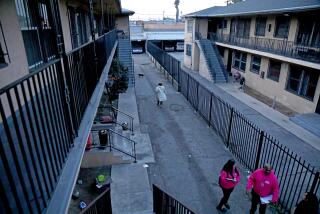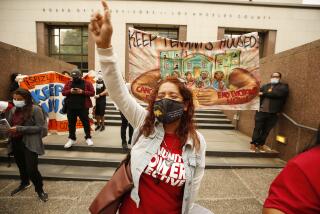With eviction protections ending, California lawmakers propose an extension to help tenants

SACRAMENTO — A state law protecting tenants from evictions in California expires in two months, but lawmakers are seeking an extension until the end of next year, citing continuing economic hardships from a new stay-at-home order that’s meant to curb the spread of the coronavirus.
The current law bars evictions as long as renters pay at least 25% of their rent and attest to financial hardship, but it expires Jan. 31, 2021. Legislation introduced Monday would extend the protections for 11 months, until Dec. 31 of next year.
“As we move into one of the most frightening COVID surges, keeping renters in their homes is crucial to ensuring our communities are healthy,” Assemblyman David Chiu (D-San Francisco), author of AB 15, said in a written statement. “Allowing these protections to expire Feb. 1 could lead to a wave of evictions and an increase in COVID cases.”
Chiu also introduced a second piece of legislation, AB 16, that would provide unspecified rental relief for those who face debt from complying with AB 15, should that extension be enacted into law. AB 15 would require tenants to pay 25% of their rent owed between Sept. 1, 2020, and Dec. 31, 2021, to avoid eviction, with any remaining amounts owed to the landlord converted to civil debt.
A bill was also introduced Monday by state Sen. Anna Caballero (D-Salinas) that would extend protections for two months — to March 31, 2021 — but the measure is likely to be amended to expand protections.
A bill by the senator last legislative session, which did not advance, would have created a process for preventing evictions for three years as long as a landlord and tenant reached an agreement on forgiving rent in exchange for the landlord receiving a tax credit.
Tenant advocates say the extension is critical. But the effort faces a difficult battle because it would require a two-thirds vote to take effect before the current law expires, and landlord groups are already voicing concerns about what the new law would look like.
The tension over the issue resulted in Gov. Gavin Newsom getting involved in intense negotiations between landlord and tenant advocates when the current law was drafted in August.
Any extension of the law would have to include financial assistance, especially for small landlords, and the length of the extension will be an issue, said Debra Carlton, an executive vice president of the California Apartment Assn., which represents landlords.
“We prefer a more incremental approach, maybe going quarter by quarter, so we can see distribution of vaccines, look at what is going to happen with our employment rate, see if businesses are going to open,” Carlton said. “That’s the approach we have asked for.”
The current law, signed by Newsom in August, and local ordinances have allowed the state to avoid mass evictions, partly because many landlords mistakenly think the state has put a blanket moratorium on evicting tenants, said Nathaly Medina, an attorney with the nonprofit Eviction Defense Network.
“We haven’t seen the tsunami of evictions that we were expecting,” Medina said.
The struggles of tenants and landlords are many and growing. Nearly a quarter of a million tenant households in California will be behind on their rent payments by the end of the year, according to an estimate by the Federal Reserve Bank of Philadelphia. The average household in arrears will owe nearly $7,000, with a total of $1.7 billion owed to landlords, the study said.
A U.S. Census Bureau survey found that, as of last month, 14% of tenant families in California reported being behind on their rent payments.
A study in May by Gary Blasi, professor emeritus at the UCLA School of Law, found there were then 365,000 households in Los Angeles County at high risk of eviction because they did not have enough income to pay rent, and those households collectively contained 558,000 children.
Last week, a rise in coronavirus cases prompted Newsom to announce new restrictions on travel and businesses that, again, will cause many households to suffer financial hardship, Medina said.
“We are expecting people who maybe got a little bit of stability by getting their job back losing work again because of this,” she said. “We are expecting to see a huge increase in evictions primarily because when AB 3088 expires on Feb. 1, tenants are expected to start paying their full rent.”
The potential that the eviction protections will expire worries Kelli Lloyd, a single mother of two who lives in Los Angeles and lost income as a real estate agent when the stay-at-home order hurt business in April.
“It could make myself and my children homeless,” Lloyd said. “The extension of AB 3088 is essential.”
Lloyd, who is attending law school, saw her ability to earn enough to cover her rent affected not only by orders restricting businesses, but also by school closures that spurred her to stay at home and home-school her children, who are 7 and 10.
She would like to see any new legislation include rent forgiveness for those struggling during the pandemic.
Landlords have their own ideas of what new legislation should look like.
This year, many large landlords with mortgages have been able to weather the effects of diminished rental returns.
“Up to this point, banks have been cooperative in providing forbearance where there were mortgages,” Carlton said. “I think smaller mom and pops are the ones really struggling.”
She said many landlords with four or fewer units were depending on the income to cover their expenses in retirement, and to allow them to pay property taxes and maintenance expenses, so the state should include financial assistance in any new law.
Although the state was facing a deep budget deficit last summer because of COVID-19, state officials last month projected that the California treasury could see a $26-billion tax windfall this year but might plunge to a projected deficit of $17.5 billion by the middle of 2025.
In addition, Carlton says there’s a chance of financial help for tenants and landlords from Washington when Democrat Joe Biden becomes president in January.
Without financial assistance from the state or federal governments, extending the eviction protection law would probably result in foreclosures, which could reduce the supply of housing for renters, Carlton warned.
As a result, the talk of extension “really hinges upon providing some dollars for landlords and tenants to pay the bills,” Carlton said. “We are not opposed to extending the sunset but financial assistance is really imperative to continue.”
Times staff writer Liam Dillon contributed to this report.
More to Read
Sign up for Essential California
The most important California stories and recommendations in your inbox every morning.
You may occasionally receive promotional content from the Los Angeles Times.











